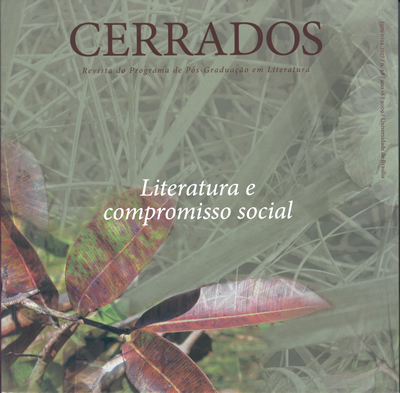Uma leitura de fragmentos: as ruínas da história em Quatro-Olhos, de Renato Pompeu
Keywords:
Society. Fragmentation. Military Dictatorship. Quatro-olhos.Abstract
This paper focuses on the fragmentation in Renato Pompeu’s Quatro-olhos (1976). Of interest is the relationship between the fragmentation of the main character and the fragmentation of the narrative and the Brazilian context characterized by the impact of the Military Dictatorship (1964-1985). Departing from Benjamin’s premises, Pompeu’s book undertakes to desacralize the concept of history gronded on positivist principles and linear, causal logic, incorporating contradictions and indeterminacies in its structure and proposing a representation of history as a succession of ruins and disasters. Thus, the links between literature and society are possible both in thematic and formal issues.
References
Aguiar, Flávio. A palavra no purgatório: literatura e cultura nos anos 70. São Paulo: Boitempo, 1997.
Arendt, Hannah. “Da violência”. In: _______. Crises da república. São Paulo: Perspectiva, 1973.
Benjamin, Walter. Magia e técnica, arte e política. Trad. de Sérgio Paulo Rouanet. 7ª. ed. São Paulo: Brasiliense, 1994.
Bosi, Alfredo. Reflexões sobre a arte. São Paulo: Ática, 1985.
Farra, Maria Lúcia Dal. O narrador ensimesmado: o foco narrativo em Vergílio Ferreira. São Paulo: Ática, 1978.
Machado, Janete Gaspar. Os romances brasileiros nos anos 70: fragmentação social e estética. Florianópolis: UFSC, 1981.
Pompeu, Renato. Quatro-olhos. São Paulo: Alfa-Omega, 1976.
Rosenfeld, Anatol. “Reflexões sobre o romance moderno”. In: _______. Texto/contexto. 3ª. ed. São Paulo: Perspectiva, 1976.
Seligmann-Silva, Márcio. “A história como trauma”. Pulsional: Revista de psicanálise. São Paulo, n. 116/117, dez. 1998-jan.1999a, p. 108-27.
Seligmann-Silva, Márcio. “Literatura do trauma”. Cult: Revista Brasileira de Literatura, n. 23, Lemos Editorial, São Paulo, jun. 1999b, p. 40-7.
Downloads
Published
Issue
Section
License
Proibida a reprodução parcial ou integral desta obra, por qualquer meio eletrônico, mecânico, inclusive por processo xerográfico, sem permissão expressa do editor (Lei n. 9.610 de 19/2/1998 )



